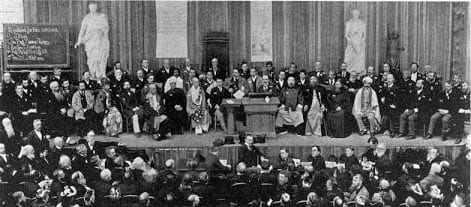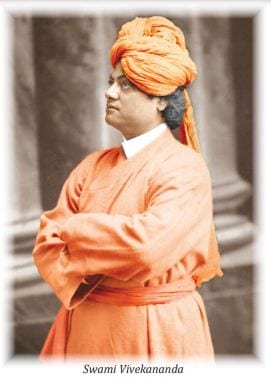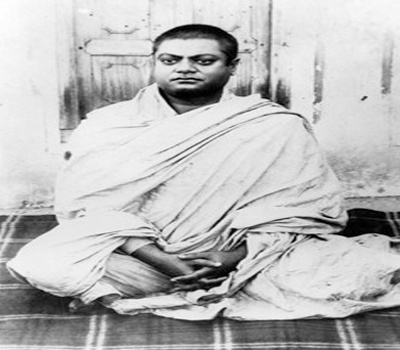THE COMPLETE WORKS of Swami Vivekananda reveal a stupendous mind with an encyclopaedic range, responding insightfully to innumerable human concerns and generating creative parameters for evaluating and improving both age-old and contemporary issues. The vast canvas of the Complete Works cannot but leave one impressed and inspired with its sheer sweep and depth. Much has been said and written about Swamiji’s thoughts on various subjects, and much can still be done, not only to analyse and interpret but also to imbibe and implement these thoughts.
Reading Swamiji’s thoughts on education is an education in itself; responding to these thoughts, however, needs a strong character, and to respond to them collectively needs a stronger national character. But if we start implementing some of Swamiji’s thoughts on education, we can build a strong individual and national character, for he did not separate education from character-building and nation-building.
One of the main parameters in judging how advanced a nation is at present, is education or the investment in universal education more than its gdp and other factors that drive economic growth. Swamiji was the first to speak on the necessity of universal education and its importance in raising the country and humanity. More than a hundred years ago he said: ‘A nation is advanced in proportion as education and intelligence spread among the masses.’1 Moreover, by declaring that ‘education is the manifestation of the perfection already in man’ (4.358), Swamiji gave a new orientation to the concept of education and also revealed its hitherto hidden dimension. This goal of perfection—spirituality—should also be universal.
Swamiji has been hailed variously as a prophet, a social reformer, a nationalist-patriot, saint, and so on. But none of these is exclusive—Swamiji is all-in-one and one-in-all. What is inclusive in all his aspects and teachings is the concept of education. Education should help individual and collective progress, for he was at heart a lover of humankind.
What is Education?
‘The child is first the old savage man—and he crushes a butterfly under his feet. Th e child is at first like the primitive ancestors of his race. As he grows, he passes through different stages until he reaches the development of his race. Only he does it swift ly and quickly’ (2.18). It is through education that every child ‘passes through diff erent stages’. A child anywhere in the world is born without culture. Education is the means that a society adopts in order to transmit its values, culture, knowledge, and also mould behaviour. Education eventually guides people to become useful members of society. Another important factor that makes this whole process possible is the capacity of humans to form lasting bonds right from infancy. These bonds help in the transmission of knowledge, first from parents and later from others, and this enables children to grow in culture and knowledge; they, inturn, add something to the received knowledge and transmit it to future generations.
Apart from what children receive Swamiji wanted an all-round education that would equally develop the body, mind, and spirit. His ideas seemed radical then, but now they are found to be precise and with far-reaching consequences. In a particular context Swamiji himself raised the question of what is education and provided a noteworthy definition: ‘What is education? Is it book-learning ? No. Is it diverse knowledge? Not even that. Th e training by which the current and expression of will are brought under control and become fruitful is called education’ (4.490). It is obvious that here Swamiji is making a clear distinction between literacy and education. And in this he had the living example of his guru, Sri Ramakrishna, who though almost ‘unlettered’ could be considered more educated than renowned scholars. Therefore, when Swamiji said: ‘You consider a man as educated if only he can pass some examinations and deliver good lectures. Th e education which does not help the common mass of people to equip themselves for the struggle for life, which does not bring out strength of character, a spirit of philanthropy, and the courage of a lion—is it worth the name?’ (7.147). It is a clear sign that education should be comprehensive and the essential components of the personality should not be neglected. Educators and legislators, more than a century after Swamiji’s message, are beginning to understand the importance of developing the inner person. Mere information or knowledge that is not pragmatic is not education. Only knowledge that matures into wisdom and inculcates the skills for living and develops the proper attitude to make the best of these skills should be the objective of education. In an ironic vein Swamiji said: ‘If education is identical with information, the libraries are the greatest sages in the world, and encyclopaedias are the Rishis’ (3.302).
Garnering his ideas from extensive travels across India and the world, Swamiji saw the results of education and compared the Indian situation with that of the West: ‘Through education comes faith in one’s own Self, and through faith in one’s own Self the inherent Brahman is waking up in them, while the Brahman in us is gradually becoming dormant’ (4.483). In these and numerous other instances Swamiji spelt out what education should do, what it is actually doing, what should be avoided, and what should be encouraged.
The Educational System
Lamenting about the contemporary system of education Swamiji said: ‘The education that our boys receive is very negative. The schoolboy learns nothing, but has everything of his own broken down—want of Shraddha is the result’(4.483–4). Swamiji’s genuine and continuing concern was with the right kind of education; it made him oft en spell out what he considered negative education. He once thundered in strong words: ‘The education you are receiving now in schools and colleges is only making you a race of dyspeptics. You are working like machines merely, and living a jelly-fi sh existence’ (7.148).
In another context he questioned: ‘Is that education as a result of which the will, being continuously choked by force through generations, is well-nigh killed out; is that education under whose sway even the old ideas, let alone new ones, are disappearing one by one; is that education which is slowly making man a machine?’ (4.490). After this significant declaration, he added: ‘It is more blessed, in my opinion, even to go wrong, impelled by one’s free will and intelligence than to be good as an automaton’ (ibid.).
The human being is, therefore, human not because of its physiological or genetic make-up, but because of the influence of education. In today’s popular mass culture, where everyone wants to do as one’s neighbour does, education only produces ‘automatons’, as he spelt out in no uncertain terms. And today this is a matter of deep concern—children are made to mindlessly engage themselves in learning by rote lessons that may get them full marks but leave them totally maladjusted to life.
Regarding the transmission of knowledge, education is an interaction between the teacher and the taught. There is no room to feel superior or inferior, for both the teachers as well as the students learn. Education itself has undergone remarkable changes. The old system of education was teacher-centred; it then became textbook-centred; now it is student-centred. Computers and the Internet have revolutionized how teachers teach and students study—education and learning has spilled out of classrooms and textbooks. Th e tremendous upsurge of information and knowledge is available, mostly free, to anyone. Distance education is now an established system that has enabled not only students but also people in far-flung areas to access knowledge.
But in spite of all these developments the basic principle of education—that all knowledge is inherent in us like fi re in the fl int, as pointed out by Swamiji—remains unchanged. The role of a good teacher is to remove the obstacles by providing a suitable environment for knowledge to manifest. Swamiji made this point in his lecture ‘The Ideal of a Universal Religion’: ‘Each of us is naturally growing and developing according to his own nature; each will in time come to know the highest truth. … What can you and I do? Do you think you can teach even a child? You cannot.
The child teaches himself. Your duty is to afford opportunities and to remove obstacles. A plant grows. Do you make the plant grow ? … What can an external teacher do? He can remove the obstructions a little, and there his duty ends’ (2.385).
Swamiji said that a real teacher should ‘not teach with any ulterior motive, for name, or fame, or anything else, but simply for love, pure love for you’ (4.27). From time immemorial teachers have been deeply revered in every culture. Of course, Swamiji’s prescription is not for teachers alone. An ideal teacher would need a worthy pupil, as he suggested: ‘The conditions necessary in the taught are purity, a real thirst for knowledge, and perseverance’ (4.24). These three crucial requirements, if met, would certainly ensure excellence in education, irrespective of curricular flaws.
In addition to this list of basic requirements that education should supply, Swamiji also noted a lacuna in the spiritual realm when he said that ‘the modern system of education gives us no facility for the development of the knowledge of Brahman’ (7.158).
Blueprint for the Future
Education for everyone was Swamiji’s lifelong concern. In ‘Modern India’ he foresaw the future needs of a free and democratic India, where there would be rapid demographic changes. The kind of education he suggested would solve many of today’s pressing problems without having to take recourse to legislative reforms or other measures.
If people learn to unite for a worthy cause, if everyone selfl essly considers the common good, if everyone uses one’s intellect to ensure that rights are distributed among all, and not only to a privileged few, it would revolutionize the educational system of India. In today’s world every society has woken up to the idea of free and universal education, which has the capacity to eradicate ignorance, poverty, and exploitation. Education brings a qualitative change in the community’s life as well as dignity and self-confidence. Swamiji stated this concept in lucid terms: ‘The ideal of all education, all training, should be this man-making. But, instead of that, we are always trying to polish up the outside. What use in polishing up the outside when there is no inside? Th e end and aim of all training is to make the man grow’ (2.15).
When Swamiji articulated his ideas on education India was not politically free to fashion its own educational curriculum; today this barrier has been removed. The indigenous educational system of India had disappeared after the Mughal conquest, except for the pathashalas, village schools that used to teach mainly the Smritis. Later, after the British consolidated their dominion in India, they established schools and colleges to create, in general, a class of people with clerical abilities who could take care of the daily running of the empire. Not much could be expected from this system. At the time of India’s independence almost the whole nation, with its huge population of millions upon millions, was illiterate. For the last six and a half decades it has been an uphill struggle of independent India to bring education to everyone. Now that there is some stability and legislation to ensure free education to children, including free midday meals, India has to fine-tune its educational system. This is the time when Swamiji’s thoughts will act as a gear lever. And this is the time for educators, and all those connected with education, to rethink the aims and objectives of education.
Swamiji’s ideas on education are not just applicable to India and other developing countries, but are also relevant to the whole world, for all through the Complete Works we find him speaking about awakening people to the infi nite Reality present in them. Th is was his life’s work. And because right education would be the most suitable path to this goal for this age, he constantly emphasized its ideals and importance.
(Source: Prabuddha Bharatha January 2013)
Reference
1 . The Complete Works of Swami Vivekananda,
9 vols (Calcutta: Advaita Ashrama, I
–8
, 1989
; 9
, 1997
), 4.482
.






Leave A Comment
You must be logged in to post a comment.